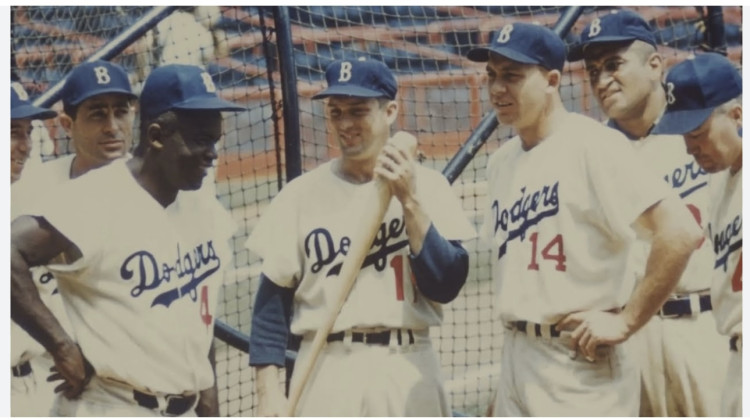Indiana native, baseball legend and human rights advocate Carl Erskine passed away last week at the age of 97.
WFYI’s Jill Sheridan sat down with Ted Green, documentary filmmaker and friend of Erskine, to talk about Erskine's lasting legacy.
This transcript has been edited for clarity and length.
Sheridan: Your documentary, "The Best We've Got"… why were you inspired to make this documentary about Carl?
Green: As I had sort of moved along in my film career, after starting kind of late in life, I've come to try to focus on celebrating the triumph of the human spirit. You know, I’ve been able to do that with Crispus Attucks, with Slick Leonard definitely with Eva Kor, all of which I partnered with WFYI on and I'm grateful for that.
But I'll tell you with Carl Erskine, it is just over the top. He's best known for being a baseball player, but that's not in the least why I did this film. It is because he was an absolutely incredible human rights champion, with a national, I'd say even international impact, but especially here in Indian.
Sheridan: The incredible life that he had started in Indiana. in Anderson, Indiana, and as you mentioned, a human rights activist, some calling him the first white ally, all that starting in 1930s, Indiana, a small town, it's a little bit unexpected.
Green: I'd say even more than a little bit... 1930s Indiana, not 10 years since the Klan actually ran the state. And of course, it was still a horribly racially divisive time. And so Carl, one day he's out there in an alley with a buddy and just shooting hoops, and up walks a nine-year-old black boy. And now, every force in society is pushing Carl away from this kid.
But instead Carl asked him to play ball. 80 years later, they were still best friends and inspiring others. And in fact, there's a mural up right now in Anderson of Johnny Wilson. That little black boy and that little white boy, Carl Erskine.
So I mean, it started early for Carl, and as he put it, prepared him for when he played on the Brooklyn Dodgers with Jackie Robinson, the first black player in Major League Baseball. While others weren't sure how to handle that on the team, and some handled it very poorly, Carl was the opposite.
And Carl and Jackie grew very, very close, which we were able to explore in the film. And both of those guys, Johnny and Jackie, then prepared Carl and his wife Betty for their biggest challenge and their biggest joy. And that was the birth of Jimmy Erskine with Down syndrome in 1960.
Sheridan: And Carl, again, an enormous advocate. Talk about his work [on disability rights] and how the documentary explores the work that he did.
Green: I chose to do a really deep dive because I didn't want to just sort of start it in 1960, and look at the way things were because, frankly, I was fascinated just learning the history, learning about the evolution and looking at how horrible this country was, and the state was in particular, with people with intellectual disabilities, especially in the early 20th century. I mean, Indiana passed the very first compulsory sterilization law in the nation. And it was as sick as it sounds.
So we go from there. And flash forward to now when by so many measures, Indiana is one of the best in the country in that regard. Special Olympics. Big push right now is for unified sports and athletes with and without disabilities competing together. Well, Indiana has by far the most high schools right now competing in that with unified sports. I was fascinated by that.
And then to learn from so many people, the people in the state who would say it took a village, but the number one reason for that sea change was number 17, Carl Erskine.
I mean, if I could say it I think the best thing you can write about Carl Erskine is what's already etched onto Jackie Robinson, his buddy Jackie Robinson's tombstone. And that is "A life is not important, except for the impact it has on other lives." I think that that was what Carl embodied for nearly 100 years right here in Indiana.
Sheridan: Thank you so much for sharing today.
Green: My pleasure. Thank you
 DONATE
DONATE








 Support WFYI. We can't do it without you.
Support WFYI. We can't do it without you.